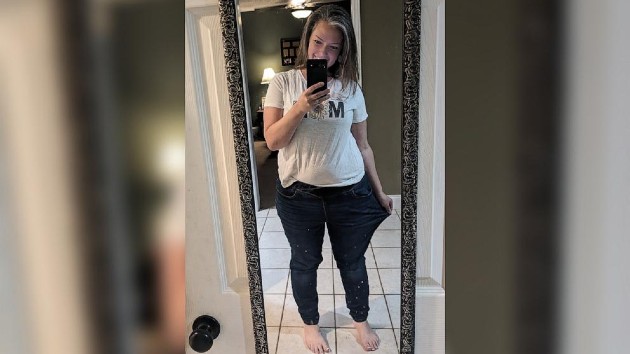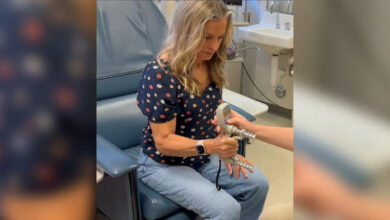Woman says she lost 60 pounds after undergoing experimental weight loss procedure

(NEW YORK) — Brooke Nelson said she was over 200 pounds and struggling to lose weight when she decided to take part in a clinical trial of a new, minimally-invasive weight loss procedure.
Within six months of the procedure, Nelson said she had lost over 20 pounds and changed how she thinks about food.
“The constant just wanting of food has drastically decreased,” Nelson told ABC News’ Good Morning America. “There’s still moments where I want a chocolate chip cookie, but there’s a lot more moments when I find myself wanting something like greens.”
The procedure Nelson underwent is called endoscopic ablation, which the lead author of the clinical trial, Dr. Christopher McGowan, says targets ghrelin, the so-called “hunger hormone.”
According to McGowan, an obesity medicine, internal medicine, and gastroenterology specialist, the procedure involves inserting a camera into the patient’s stomach while fluids are administered to protect the underlying stomach tissue.
Then, a tiny device ablates, or burns, the lining of the upper portion of the stomach that produces ghrelin, a hormone that plays a role in everything from telling your brain you are hungry to inhibiting insulin secretion and helping your body store fat.
The clinical trial of the procedure that Nelson took part in has shown sustained weight loss and decreased appetite for patients, according to McGowan, founder of True You Weight Loss in Cary, North Carolina.
“We do have patients who are a year or more beyond their initial procedure, and what we are seeing is that they continue to have a diminishment, decrease in hunger [and] continue to report greater control over eating,” McGowan told GMA, adding that trial participants, on average, reduced their overall weight by 7%.
McGowan said one benefit of endoscopic ablation is that it is a minimally invasive procedure.
Currently, patients who need surgical intervention for obesity have the option of bariatric surgery, different types of which work by making changes to the digestive system, including reducing the size of the stomach, according to the National Institute of Diabetes and Digestive and Kidney Diseases.
Bariatric surgery is typically considered an option for adults who “have a body mass index of 40 or more or a BMI of 35 or more with a serious health problem linked to obesity,” according to the NIDDK.
Obesity is a medical condition that affects nearly 42% of people in the U.S., according to the U.S. Centers for Disease Control and Prevention. Obesity has been associated with conditions including stroke and heart disease, hypertension and breathing problems such as sleep apnea.
“For patients who might be afraid of surgery, this may be more acceptable,” McGowan said of endoscopic ablation.
Risks of the procedure include ulcers and bleeding, according to McGowan.
“Risks of this technology could include things like ulcers, bleeding, somehow injuring the stomach. These were things we were really careful about,” he said. “In this case, everything was mild and that was the cramping and gas and nausea, things you’d expect when you’d perform a procedure on the stomach. But there were no complications whatsoever.”
The clinical trial led by McGowan included just 10 female patients and was the first time endoscopic ablation targeting ghrelin had been tested in humans.
McGowan will present the results of the trial formally later this month at a medical conference, known as Digestive Disease Week, in Washington, D.C.
From there, the procedure will need to undergo additional testing to determine safety and long-term outcomes before it could eventually be made available to the general public.
Copyright © 2024, ABC Audio. All rights reserved.






